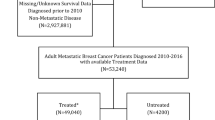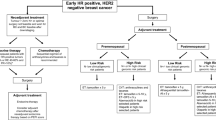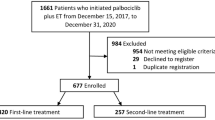Abstract
The aim of this multicenter, prospective, longitudinal phase IV study was to establish the optimal duration of neoadjuvant letrozole that would allow breast conservation surgery (BCS) in patients with early breast cancer who were initially unsuitable. Primary, invasive, estrogen-receptor- and/or progesterone-receptor-positive breast cancer patients, with large tumors (≥T2 i.e., >20 mm) not initially suitable for BCS, received 2.5 mg letrozole p.o. daily. Patients continued treatment until they became eligible for BCS, progressed, failed to meet criteria for BCS and withdrew for scheduled mastectomy, withdrew for other reasons, or completed 12 months of letrozole treatment without a BCS decision being made. A total of 146 patients were enrolled; seven patients who did not have a valid postbaseline tumor assessment were excluded from the final efficacy analysis. At study closure, 69 % of patients (96 of 139) were eligible for BCS. The median time to achieve a tumor response sufficient to allow BCS with neoadjuvant letrozole was 7.5 months (95 % CI 6.3–8.5 months). Letrozole was well tolerated, and most adverse events were mild-to-moderate (grade 1–2). The results from this trial suggest that extended letrozole therapy in the neoadjuvant setting (7.5 months), as opposed to conventional treatment of 4 months, is optimal to achieve maximum reduction in tumor volume sufficient for BCS.



Similar content being viewed by others
References
Wolmark N, Wang J, Mamounas E, Bryant J, Fisher B (2001) Preoperative chemotherapy in patients with operable breast cancer: nine-year results from National Surgical Adjuvant Breast and Bowel Project B-18. J Natl Cancer Inst Monogr 30:96–102
Bear HD, Anderson S, Smith RE, Geyer CE Jr, Mamounas EP, Fisher B et al (2006) Sequential preoperative or postoperative docetaxel added to preoperative doxorubicin plus cyclophosphamide for operable breast cancer: National Surgical Adjuvant Breast and Bowel Project Protocol B-27. J Clin Oncol 24:2019–2027
Rastogi P, Anderson SJ, Bear HD, Geyer CE, Kahlenberg MS, Robidoux A et al (2008) Preoperative chemotherapy: updates of National Surgical Adjuvant Breast and Bowel Project Protocols B-18 and B-27. J Clin Oncol 26:778–785
Early Breast Cancer Trialists’ Collaborative Group (EBCTCG) (2005) Effects of chemotherapy and hormonal therapy for early breast cancer on recurrence and 15-year survival: an overview of the randomised trials. Lancet 365:1687–1717
Semiglazov VF, Semiglazov VV, Dashyan GA, Ziltsova EK, Ivanov VG, Bozhok AA et al (2007) Phase 2 randomized trial of primary endocrine therapy versus chemotherapy in postmenopausal patients with estrogen receptor-positive breast cancer. Cancer 110:244–254
Bhatnagar AS (2007) The discovery and mechanism of action of letrozole. Breast Cancer Res Treat 105(Suppl 1):7–17
Femara Prescribing Information: http://www.femara.com. Accessed 7 Sept 2011
Eiermann W, Paepke S, Appfelstaedt J, Llombart-Cussac A, Eremin J, Vinholes J et al (2001) Preoperative treatment of postmenopausal breast cancer patients with letrozole: a randomized double-blind multicenter study. Ann Oncol 12:1527–1532
Krainick-Strobel UE, Lichtenegger W, Wallwiener D, Tulusan AH, Jänicke F, Bastert G et al (2008) Neoadjuvant letrozole in postmenopausal estrogen and/or progesterone receptor positive breast cancer: a phase IIb/III trial to investigate optimal duration of preoperative endocrine therapy. BMC Cancer 8:62
Renshaw L, Murray J, Young O, Cameron D, Miller WR, Dixon JM, et al (2004) Is there an optimal duration of neoadjuvant letrozole therapy? Breast Cancer Res Treat 88(Suppl 1):S36–S37
Dixon JM, Renshaw L, Macaskill EJ, Young O, Murray J, Cameron D et al (2009) Increase in response rate by prolonged treatment with neoadjuvant letrozole. Breast Cancer Res Treat 113:145–151
Kaufmann M, von Minckwitz G, Bear HD, Buzdar A, McGale P, Bonnefoi H et al (2007) Recommendations from an international expert panel on the use of neoadjuvant (primary) systemic treatment of operable breast cancer: new perspectives 2006. Ann Oncol 18:1927–1934
Olson JA Jr, Budd GT, Carey LA, Harris LA, Esserman LJ, Fleming GF et al (2009) Improved surgical outcomes for breast cancer patients receiving neoadjuvant aromatase inhibitor therapy: results from a multicenter phase II trial. J Am Coll Surg 208:906–914
Ellis MJ, Suman VJ, Hoog J, Lin L, Snider J, Prat A et al (2011) Randomized phase II neoadjuvant comparison between letrozole, anastrozole, and exemestane for postmenopausal women with estrogen receptor-rich stage 2 to 3 breast cancer: clinical and biomarker outcomes and predictive value of the baseline PAM50-based intrinsic subtype–ACOSOG Z1031. J Clin Oncol 29:2342–2349
Moyer A (1997) Psychosocial outcomes of breast-conserving surgery versus mastectomy: a meta-analytic review. Health Psychol 16:284–298
Mansell J, Monypenny IJ, Skene AI, Abram P, Carpenter R, Gattuso JM et al (2009) Patterns and predictors of early recurrence in postmenopausal women with estrogen receptor-positive early breast cancer. Breast Cancer Res Treat 117:91–98
Acknowledgments
The authors take full responsibility for the content of this publication and confirm that it reflects their viewpoint and medical expertise. They also wish to acknowledge StemScientific, funded by Novartis Pharmaceuticals UK, for providing editorial support. Novartis did not influence the content of the manuscript, nor did the authors receive financial compensation for authoring the manuscript. The authors would also like to acknowledge the following study investigators: Lester Barr, Hugh Bishop, Michael Dixon, Abigail Evans, Clive Griffith, Frances Kenny, Alison Lannigan, Duraisamy Ravichandran, Elizabeth Shah, Michael Shere, Alistair Thompson, Mysore Venkatachala, Constantinos Yiangou, and Charles Zammit.
Conflict of interest
Carolyn Cordiner, Nuala Moss, Ashu Gandhi, Chris Wilson, Gillian Ellis, Gerald Gui, and Anthony I. Skene declare that they have no conflicts of interest. Robert Carpenter has performed a consultant/advisory role for Novartis, and has received funding from Novartis. Julie C. Doughty has received remuneration from Pfizer and Novartis, and has performed a consultant/advisory role for Novartis and Roche. Chris Andrews is an employee and stock owner of Novartis.
Ethical standards
The study was performed in accordance with the International Conference on Harmonization Guidelines for Good Clinical Practice; applicable local regulations were observed along with ethical principles according to the Declaration of Helsinki.
Author information
Authors and Affiliations
Corresponding author
Additional information
On behalf of the study investigators.
Electronic supplementary material
Below is the link to the electronic supplementary material.
Rights and permissions
About this article
Cite this article
Carpenter, R., Doughty, J.C., Cordiner, C. et al. Optimum duration of neoadjuvant letrozole to permit breast conserving surgery. Breast Cancer Res Treat 144, 569–576 (2014). https://doi.org/10.1007/s10549-014-2835-8
Received:
Accepted:
Published:
Issue Date:
DOI: https://doi.org/10.1007/s10549-014-2835-8




